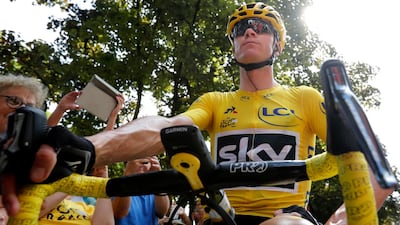Chris Froome’s battle to take part in the Tour de France is in limbo until a verdict on his appeal against the organisers’ decision to exclude him is delivered Wednesday, just three days before the race starts.
The four-time winner’s absence from next Saturday’s starting line on the Island of Noirmoutier is still far from certain because in three comparable cases in the past, riders were cleared to take part after last-minute appeals.
Froome was probably already expecting a hostile reception in France with an “adverse analytical finding” for asthma drug salbutamol from last year’s Vuelta a Espana still hanging over him and Team Sky.
The British rider has denied any wrongdoing.
From the outset, Tour de France Amoury Sports Organisation (ASO) have argued their priority to is protect the integrity of the world’s best-known cycling race, saying they do not want another winner with an asterisk next to his name on their honours list.
The news that they were excluding Froome was leaked by French daily Le Monde on Sunday, and confirmed to AFP by sources close to the organisers. ASO had informed Sky by email that Froome would not be included on the start list.
Sky immediately appealed to the French Olympic Committee, who will meet on Tuesday with a representative of either side and will deliver a binding verdict on Froome’s participation on Wednesday.
The decision will be made by three judges, who will not rule on whether Froome is guilty of doping, but rather whether or not him taking part would damage the Tour de France’s image.
ASO and Sky are now refusing to comment further and are unlikely to do so before the hearing.
Despite his adverse test for salbutamol, Froome rode and won the Giro d’Italia in May.
There was a sense of anger in cycling circles at the way Sky failed to tell ASO of the adverse finding, and the organiser has reached into its statutes to let Froome know he is unwelcome in their event, even if they lose on appeal, as it has done before.
ASO’s article 28 says it “reserves the right to refuse participation in -- or to exclude from -- the event, a team or any of its members whose presence would be such as to damage the image or reputation of ASO or the event”.
It first took such measures in 1999 with Richard Virenque and the TVM team over the Festina doping affair, but they were cleared to take part by the International Cycling Union (UCI).
A blood doping scandal broke before the 2006 Tour with Spain’s Operation Puerto, which led to ASO shutting the door on the Astana team, but they were cleared at the last minute by the Swiss-based Court of Arbitration for Sport. In the end, Astana did not take part because five of their team were implicated in doping individually.
In 2009, Belgian rider Tom Boonen, a major name in the sport, was excluded having tested positive for cocaine, which ASO said was harmful to their image -- the same argument it is using with Froome. However a French court cleared the Quick Step rider 24 hours before the opening day time-trial.
Should Froome take part he will be hot favourite to win the race as, at 33, he remains the best three-week tour rider on the contemporary cycling scene.
Froome would thereby join four other men to have won the Tour de France five times -- Jacques Anquetil, Eddy Merckx, Bernard Hinault and Miguel Indurain.
He would also be the first man for 20 years to win a Giro-Tour double and he would also have four consecutive Grand Tours to his name.
Groupama-FDJ boss Marc Madiot, whose team will line up for the Tour, told AFP he felt ASO’s decision was bold but right.
“It’s political, courageous and logical,” Madiot, a former professional cyclist, told AFP.
“(But) it does not necessarily mean Froome will not be on the starting line-up. There is a judicial hearing and I trust my Anglo-Saxon friends will organise a strong defence,” he said.

